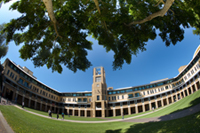|
||||||||||||||||||||||||||||||||||||||||||||||||||||||||
| International Studies | ||||||||||||||||||||||||||||||||||||||||||||||||||||||||

The International Studies degree program offers streams in Asian Studies, Development Studies, European Studies, Globalisation, International Business, International Relations and Languages. All streams provide a thorough preparation for further study and employment in areas vital to Australia's increasing participation in the international arena.
Students are offered a place in the degree program and choose their preferred stream on enrolment. All streams include an individual study program overseas, normally of two semesters, during the third and/or fourth year of the degree. Students who have made satisfactory progress will be eligible for a contribution towards the expenses involved. The Asian Studies stream combines the study of an Asian language, an Asian Studies program and a core program in International Studies. Languages available are Chinese, Indonesian, Japanese and Korean. The Development Studies stream includes a Development Studies program, as well as a core program in International Studies and a sequence of language study. The European Studies stream combines the study of a European language, a European Studies program and a core program in International Studies. Languages available are French, German, and Spanish. The Globalisation Studies stream includes a Global Studies program, as well as a core program in International Studies and a sequence of language study. The International Business stream includes an International Business program, as well as a core program in International Studies and a sequence of language study. The International Relations stream includes an International Relations program, as well as a core program in International Studies and a sequence of language study. The Language Studies stream (Chinese Studies, French Studies, German Studies, Hispanic Studies, Japanese Studies or Korean Studies) requires an in depth study of one language as well as a further sequence of language study in another language. These streams above are also available within the combined degree program Bachelor of International Studies / Bachelor of Laws. Studying International Studies at UNSW The Faculty of Arts and Social Sciences offers six undergraduate programs (Asian Studies, Development Studies, European Studies, Globalisation, International Business, and Languages) leading to the award of the degree of Bachelor of International Studies. Students in all four streams may elect to graduate with distinction if they have achieved an average of Distinction or above in their studies for the pass degree. They may also apply to enter a further Honours Level Program in one or two Schools/Programs of the Faculty. For further information please refer to the: School of Social Sciences and International Studies.
International Studies can be studied as
|
||||||||||||||||||||||||||||||||||||||||||||||||||||||||



